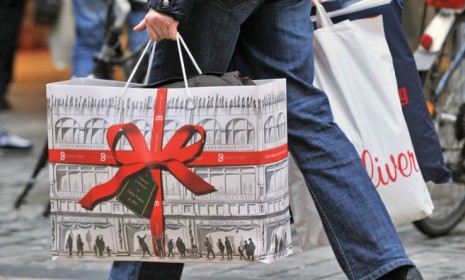Why December 26 is a 'monster' shopping day: 4 theories
The day after Christmas is second only to Black Friday as the year's busiest shopping day — thanks, in part, to a tendency for people to buy themselves delayed presents

A free daily email with the biggest news stories of the day – and the best features from TheWeek.com
You are now subscribed
Your newsletter sign-up was successful
Plan on hitting the mall today? You're not alone. In a recent American Express survey, 57 percent of Americans said they planned to go shopping on December 26, up from 43 percent in 2010. In fact, the day after Christmas is second only to Black Friday as the busiest shopping day of the year. But why are more Americans willing to circle around crowded parking lots than last year? Here, 4 theories:
1. More people are spending on themselves
In the days leading up to Christmas, Americans are consumed with shopping for friends and family. After the 25th, the focus shifts. One out of five shoppers will be cashing in gift cards they got from Santa, says Brad Tuttle at TIME, with many purchasing holiday presents for themselves — "a continuation of one of the season's hottest trends." What are they buying? TVs and clothing, primarily.
The Week
Escape your echo chamber. Get the facts behind the news, plus analysis from multiple perspectives.

Sign up for The Week's Free Newsletters
From our morning news briefing to a weekly Good News Newsletter, get the best of The Week delivered directly to your inbox.
From our morning news briefing to a weekly Good News Newsletter, get the best of The Week delivered directly to your inbox.
2. Struggling retailers mean stronger discounts
While sales over Thanksgiving weekend of this year were promising, many stores bit off more inventory than they could chew for the month of December. Retailers like Gap and Ann Taylor, for example, are offering store-wide clearances of more than fifty percent off, looking to unload merchandise. "The inventory is worth so much less in two weeks," one anonymous chief executive of a retailer tells the New York Times. Stores are trying to take advantage of the momentary surge in traffic before the New Year. "With that kind of inventory, you’ve got to get rid of it. Whatever the margin is today, it’s that much lower next week and the week after."
3. The day after Christmas falls on a Monday instead of a Sunday
One reason for the uptick in shopping interest, says Fox News, is that compared with last year's big shopping day — which fell on a Sunday, "when many people spend time with family" — 2011's post-Christmas spree comes on a Monday. And since most offices are giving employees the day off, they have ample time to brave long return lines.
A free daily email with the biggest news stories of the day – and the best features from TheWeek.com
4. People are simply postponing Christmas Day
Since more retailers are offering huge bargains on a "wider variety of items than they do in the weeks leading up to the holiday," some "cost-conscious" shoppers are waiting until after December 25th to go gift shopping, says Christina Rexrode at the Associated Press. Online spending in the days following Christmas has grown as much as 56 percent compared to previous years, and when you factor in the "the headache of shopping in the pre-Christmas madness," it's easy to understand why celebrating Christmas a little later has come to make sense.
Sources: Associated Press, Fox News, New York Times, TIME